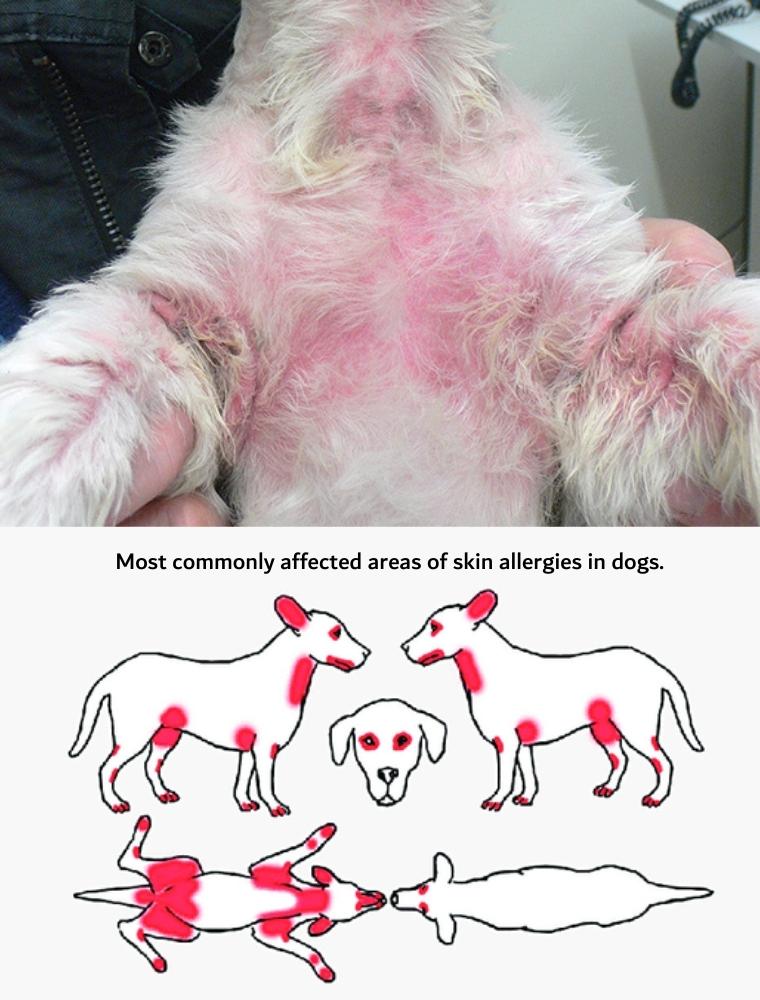Good Ideas To Selecting Dog Herbalist
Wiki Article
Probiotics Can Be Effective In The Treatment Of Skin Allergies In Pets And Canines.
Probiotics can play an essential role in managing and alleviating skin allergies in both dogs and cats. The beneficial bacteria help to maintain the gut microbiome, which in turn, supports the immune system as well as skin. Probiotics can be beneficial to pets suffering from allergies:
Immune System Regulation
Balanced Immune Response:
Function: Probiotics aid in regulating the immune system by encouraging the growth of beneficial bacteria as well as neutralizing harmful bacteria in the intestine.
Benefits A well-balanced immune system can help reduce hypersensitivity, which can cause skin allergies. This reduces the severity of and frequency of allergic reactions in pets.
Inflammation Reduction
Anti-inflammatory Effects:
Function: Certain probiotic strains can create anti-inflammatory compounds and alter the body's inflammatory response.
Benefits: Through reducing the severity of inflammation, probiotics are able to reduce itching and inflammation that is often associated with skin allergies that can result in healthier skin.
Gut-Skin Axis
Improvement in Gut Health:
Function: The gut's surface axis refers the relationship between the health of your gut and your skin health. Probiotics have been shown to improve the gut barrier and digestive health function.
Benefits: A healthy gastrointestinal tract is able to help to stop the leaking into the bloodstream of allergens and toxins that can cause skin reactions. Additionally, it can reduce the signs of skin allergies.
Strengthening Skin Barrier
Improve Skin Barrier Function
Function: They can affect the production of other lipids such as ceramides which are important to maintain a healthy epidermis barrier.
Benefits A thicker skin barrier helps to protect against allergens from the environment. This helps reduce skin irritation and allergic reactions.
Allergy Symptom Management
Treatment for Symptoms:
Function: Probiotics can aid in reducing symptoms through modulating the release of histamines as well as other chemicals that are involved in allergic reactions.
Pets benefit from this treatment may help relieve itching, as well as other symptoms of skin allergies.
Increased Microbial Diversity
Increased Microbial Diversities:
Function: The probiotics enhance the diversity of your gut microbiome. They are essential to a balanced response to the immune system.
Benefits: By preventing an overgrowth harmful bacteria, which may trigger allergies, a varied microbiome can better ensure your overall well-being.
Specific Probiotic strains
Lactobacillus, Bifidobacterium and other probiotics have proven to ease skin allergies.
LactobacillusrhamnosusGG is known for its role in improving digestive health and decreasing allergies.
Bifidobacterium animalis: It aids in reducing inflammation and improving the immune response.
Considerations and Usage
Dosage: The dosage of probiotics is determined by the size of your pet's body, weight, and the requirements for health of your pet. It is important to follow the recommendations of your veterinarian or the product label instructions.
Formulations: Pet probiotics come in different forms including chewables, chewables, capsules and powders. It is recommended to choose a high quality, pet-specific supplement to ensure your pet's safety.
Monitoring and Side effects Although probiotics are safe in general, it is important to monitor your pet for adverse reactions such as digestive upset. It is possible to reduce the risk of the risk of adverse reactions by starting with a smaller dose and then gradually increasing the dosage.
Conclusion
Probiotics assist dogs and cat owners control their allergies to skin by regulating immune function, reducing irritation, improving the barrier of the skin, and improving gut health. Regular use of probiotics could alleviate allergic symptoms in pets, improve the health of their skin and increase their overall quality of life. Have a look at the most popular treatment for cushings disease in dogs blog for website info including pet eye supplements, pet meat protein supplements, pet supplements for pets with fear of new environments, pet supplements for pets with fear of nail trimming, herbal medicines for dogs and cats, pet supplements for pets with fear of being alone, pet supplements for pets with fear of anesthesia, pet weight loss supplements and more.

Quercetin Is Effective In Treating Skin Allergies Of Both Cats And Dogs.
Quercetin is a flavonoid which is found in both vegetables and fruits, has shown to be beneficial in the management of allergies to the skin of dogs and cats. Here's how quercetin helps with allergic skin conditions in pets:
Anti-inflammatory properties
Reduced inflammation
Function Quercetin's anti-inflammatory properties block the production of pro-inflammatory chemicals, such as cytokines and histamines.
Benefits: Quercetin can reduce the inflammation that is associated with allergies of the skin, decreasing redness and swelling.
Antihistamine Effects
Natural Antihistamine:
Quercetin is a drug that blocks histamine release in mast cells. Histamines are chemical compounds that cause itching, as well as other allergic symptoms.
Benefits As a natural antihistamine, quercetin can reduce itching and can also help in allergies of other kinds. This makes it a great choice for pets suffering from allergies.
Antioxidant Activity
Oxidative Stress
The function: Quercetin is a potent antioxidant that helps neutralize free radicals as well as reduce oxidative stress.
Benefits: Reduced the oxidative stress of skin cells, aid in healing and improve skin health.
Immune System Modulation
Balanced Immune Reaction
Function: Quercetin works to modulate the immune system, ensuring that allergens are handled in a healthy manner.
Benefits: A well-balanced immune system can prevent hyperreactivity to allergens. This reduces the severity and frequency with that allergic reactions occur.
The enhancement of skin barrier function
Strengthening Skin Barrier:
The function: Quercetin helps in the production of ceramides and other lipids necessary for maintaining a healthy skin barrier.
Benefits: A strong skin barrier shields you from environmental allergens. It also lowers the chance of developing infections and allergic reactions.
Allergy Symptom Management
Treatment of symptoms:
The function: Quercetin reduces inflammation by blocking the enzymes responsible for it, such as Lipoxygenase.
Benefits: This results in a reduction in symptoms such as itching swelling, and redness which provides comfort and relief for pets.
Utilization and Recommendations
Dosage: The dosage is based on the size, weight and requirements for health of your pet. The directions on the label or the advice of the vet are essential. Quercetin and bromelain can be utilized together to enhance the effectiveness of the product.
Quercetin supplements for pets come in many forms. They include capsules, tablets as well as powders. Selecting a pet-specific item of high-quality is crucial for security and effectiveness.
Quercetin has a low chance of causing side effects. However, higher doses could cause stomach upset in certain animals. Start with a low dose and increasing it slowly to minimize side effects. It is important to check for any adverse reactions, such as vomiting or nausea.
Also, you can read our conclusion.
Quercetin aids in reducing skin allergies in dogs as well as cats. Its antihistamine, antiinflammatory and antioxidant properties help reduce itching, inflammation, and oxidative stress. It is improving the skin barrier and regulating the immune system. Regular use of the product can help decrease allergic reactions and improve the health of your skin. This will enhance the quality life for animals suffering from skin allergies. Take a look at the best yeast infections in dogs blog for site recommendations including pet joint supplements, pet supplements for pets with fear of other animals, pet supplements for working dogs, pet astragalus supplements, pet supplements for pets with hip dysplasia, pet digestive supplements, pet skullcap supplements, pet supplements for pets with fear of elevators and escalators and more.

Apple Cider Vinegar Is Effective In Treating Yeast Infections In Cats And Dogs.
ACV is usually recommended by veterinarians as a natural remedy for yeast infections. ACV is acidic and could produce side effects. While some anecdotal and research-based evidence supports its advantages, it is best to make use of it with the advice by a veterinarian due its potential side-effects and its acidic nature. ACV can help treat yeast infections.
Antifungal Properties
Acidic Environment
ACV is acidic and has the typical pH range between 2.5 to 3. This acidic pH may hinder yeast growth.
Benefits The benefits of applying ACV topically to your pet or adding it in their bath water will help to in reducing the growth of yeast on their skin.
Skin pH Regulated
Balancing Skin pH:
ACV helps to regulate the pH of the skin, creating an endocrine-friendly barrier and hindering the growth of yeast.
Benefits - Maintaining the pH balance of the skin is an excellent method to prevent yeast infections and to maintain overall health of the skin.
Anti-inflammatory effects
Reduced inflammation
ACV is mildly anti-inflammatory.
Benefits - Reducing inflammation helps to alleviate symptoms like redness, discomfort and irritation that are common with yeast infections.
Support for Digestive Health
Internal Use
ACV could help improve digestive health, and help balance the gut bacteria after ingesting.
Benefits: A more healthy gut environment could indirectly limit yeast overgrowth through supporting overall immunity and microbial balance.
Questions and Use
Topical Use: Dilute it with water (typically 1-2 parts ACV per 1 part water) and apply as a spray on the ears or the skin. Avoid applying directly on sensitive skin or open wounds.
In the event of considering using it internally, consult with a veterinarian first. ACV must be highly diluted (1 teaspoon to 1 tablespoon per cup of water), and administered in small doses to prevent gastrointestinal discomfort or upset.
Check for any signs of irritation, or any allergic reaction after applying ACV to the skin. Do not use it when you observe any negative side effects.
Consultation with a Veterinarian: Prior to using ACV to treat yeast infection in animals, it's important to speak with a vet. They can guide you in the right dilution methods, application techniques, and potential risks to your pet.
Click here to view the complete article
Although apple cider may be beneficial in treating yeast infections among dogs and cats it should still be handled with care under the supervision of a veterinarian. ACV could have mild anti-inflammatory and antifungal effects because of the acidity of its nature. But, a proper dosage and careful application are essential to avoid irritation and adverse reactions. ACV treatment is only effective when it is accompanied by veterinary advice. Follow the top rated pet wellbeing australia for website tips including ear infections in dogs, pet eyebright supplements, uti natural treament, pet supplements for pets with storm anxiety, pet digestive supplements, pet supplements for pets with ear infections, pet supplements for pets with skin infections, kidney support gold and more.
